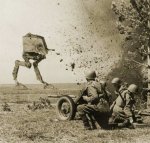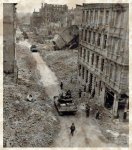Death's Companion
General Ugg Apologist.
Makes sense.Axis of Time drifted after the first book because Birmingham had originally planned to have Books 2 and 3 be a Nazi-Soviet alliance, with how things would play out from there. That's why Book 1 ended with that proposal of Nazi-Soviet alliance.
Birmingham was persuaded on soc.history.what-if (he used to post there too, not just T'Other Place) that such an alliance would be utterly impossible since Stalin would never trust Hitler again after 22 June 1941. So he turned it into a ceasefire only, which made more historical sense, but meant that his planned villains of the trilogy didn't work in the same way, so he had to rewrite it on the fly.
Of course, the original plan for Axis of Time was for the fleet to be dropped into a world where the Axis won, but he dropped that idea fairly quickly.
Its a shame though because that pivot played a big part in killing the series dead for me.




